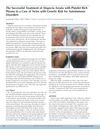 14 citations,
December 2010 in “Journal of human genetics”
14 citations,
December 2010 in “Journal of human genetics” A Japanese patient with IFAP syndrome had a severe MBTPS2 gene mutation but showed milder symptoms than previously observed cases.
 10 citations,
February 2008 in “Photochemistry and photobiology”
10 citations,
February 2008 in “Photochemistry and photobiology” Vitamin D receptor can control the hairless gene linked to hair loss even without vitamin D.
 10 citations,
February 2007 in “Current Opinion in Endocrinology, Diabetes and Obesity”
10 citations,
February 2007 in “Current Opinion in Endocrinology, Diabetes and Obesity” Low birthweight and rapid weight gain after birth may increase the risk of developing polycystic ovary syndrome.
 9 citations,
April 2019 in “International journal of molecular sciences”
9 citations,
April 2019 in “International journal of molecular sciences” Human hair grows better in a special gel that mimics skin.
 9 citations,
March 2015 in “International reviews of immunology”
9 citations,
March 2015 in “International reviews of immunology” Skin abnormalities can indicate immunodeficiency due to shared origins with the immune system.
 9 citations,
February 2013 in “Hormone and Metabolic Research”
9 citations,
February 2013 in “Hormone and Metabolic Research” Mutations in the CYP21A2 gene are not a major factor in causing PCOS.
 8 citations,
March 2014 in “American Journal of Pathology”
8 citations,
March 2014 in “American Journal of Pathology” Damaged hair follicles make mice more prone to skin inflammation and skin cancer after UV exposure.
 6 citations,
November 2017 in “Scientific reports”
6 citations,
November 2017 in “Scientific reports” The R343H mutation in the VDR gene causes vitamin D-resistant rickets with alopecia by impairing specific gene activity.
 6 citations,
March 2016 in “Scandinavian journal of immunology”
6 citations,
March 2016 in “Scandinavian journal of immunology” Janus kinase inhibitors show promise in treating alopecia areata but need more safety research.
 4 citations,
July 2013 in “Journal of Dermatological Science”
4 citations,
July 2013 in “Journal of Dermatological Science” Pregnancy right after giving birth in mice lacking IL-10 causes milk that leads to liver issues and hair loss in their babies.
 3 citations,
March 2017 in “International journal of women’s dermatology”
3 citations,
March 2017 in “International journal of women’s dermatology” Some domesticated animals have the same genetic skin diseases as humans, which can help doctors understand human genetic mutations.
 3 citations,
October 2010 in “Journal of Experimental & Clinical Medicine”
3 citations,
October 2010 in “Journal of Experimental & Clinical Medicine” Obesity is a major risk factor for insulin resistance in Taiwanese women with PCOS, which is also an independent risk factor for metabolic syndrome.
 2 citations,
May 2018 in “Expert opinion on orphan drugs”
2 citations,
May 2018 in “Expert opinion on orphan drugs” Newborn screening and gene therapy are expected to improve outcomes for Omenn syndrome patients.
 August 2024 in “Frontiers in Pharmacology”
August 2024 in “Frontiers in Pharmacology” Antibody treatments show promise for hair loss but need more research.
 March 2024 in “bioRxiv (Cold Spring Harbor Laboratory)”
March 2024 in “bioRxiv (Cold Spring Harbor Laboratory)” Minoxidil treatment improves heart defects in a DiGeorge syndrome model.

Androstenedione is better than testosterone for diagnosing PCOS in Indian women.
 September 2023 in “Stem cell reviews and reports”
September 2023 in “Stem cell reviews and reports” Scientists found a new, less invasive way to get stem cells from horse hair for veterinary medicine.

Inhibiting AP-1 changes skin tumor types and affects tumor cell identity.

Researchers found a genetic link for hereditary hair loss but need more analysis to identify the exact gene.
 August 2019 in “Research Square (Research Square)”
August 2019 in “Research Square (Research Square)” Certain long non-coding RNAs in cashmere goats affect hair growth when treated with a specific growth factor.
 January 2018 in “bioRxiv (Cold Spring Harbor Laboratory)”
January 2018 in “bioRxiv (Cold Spring Harbor Laboratory)” Researchers found key regions in the mouse hairless gene that control its activity in skin and brain cells, affecting hair follicle function.
 January 2018 in “Hair transplant forum international”
January 2018 in “Hair transplant forum international” PRP injections can effectively treat alopecia areata.
 August 2015 in “MOJ proteomics & bioinformatics”
August 2015 in “MOJ proteomics & bioinformatics” ePUKs could be valuable for regenerative medicine due to their wound healing abilities.
 April 2019 in “Journal of Investigative Dermatology”
April 2019 in “Journal of Investigative Dermatology” Differences in growth factors in platelet-rich plasma therapy for hair loss can vary between patients and can be influenced by the devices used, possibly leading to inconsistent results.
 773 citations,
August 2017 in “International Journal of Molecular Sciences”
773 citations,
August 2017 in “International Journal of Molecular Sciences” The secretions of mesenchymal stem cells could be used for healing without using the cells themselves.
 610 citations,
April 2014 in “Nature Reviews Immunology”
610 citations,
April 2014 in “Nature Reviews Immunology” The document concludes that understanding how the skin's immune system and inflammation work is complex and requires more research to improve treatments for skin diseases.
 438 citations,
October 2010 in “Oncogene”
438 citations,
October 2010 in “Oncogene” Keratins help protect cells, aid in cancer diagnosis, and influence cancer behavior and treatment.
 343 citations,
December 2008 in “Endocrine Reviews”
343 citations,
December 2008 in “Endocrine Reviews” Metformin helps with menstrual cycles and insulin levels in PCOS but is less effective for hair growth, diabetes prevention, and weight loss, and may improve fertility and reduce diabetes risk.
 306 citations,
April 2019 in “International Journal of Molecular Sciences”
306 citations,
April 2019 in “International Journal of Molecular Sciences” The skin has a complex immune system that is essential for protection and healing, requiring more research for better wound treatment.
 278 citations,
March 2013 in “Gut”
278 citations,
March 2013 in “Gut” Anti-IL-12/IL-23 antibody therapy effectively treats psoriasiform skin lesions in IBD patients.






























